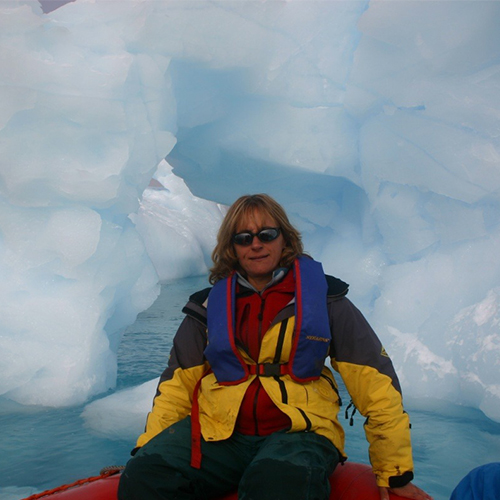Overview
With a background in computer programming and a passion for sustainability, Anne found her purpose in integrating environmental challenges into education through technology. Anne embraces challenge in all aspects of her life, and this has led her to go on an expedition to the Arctic with a team of global warming scientists.
Interview with Anne Burke
Can you tell us about your time at Deakin? Is there anything you especially remember?
I especially remember how flexible the courses were particularly at the time I undertook them. Deakin was one of the first to have virtual classrooms and the immersive approach to complete MBA subjects. This extreme flexibility made it possible for me to work full time, look after my 2 young children and complete further studies.
What has been your journey since finishing your course? Briefly outline your career path prior to your current role.
I came from a computer programming background and as a result was initially employed in leading innovative laptop schools. I have taught Prep-10 as well as university and community programs. My strategic business training enabled me to quickly moved into leadership positions. I began in mainstream schools and then moved into a role as Director of the first youth incubator in the world, ‘The lab.3000 Incubator’, before moving to the Oracle Corporation to design education solutions. I returned to mainstream schools to roll out the digital technology curriculum, where I have the opportunity to engage students and teachers through digital technologies – including robotics, coding, artificial intelligence and data analytics. I am passionate about sustainability and I build it into all my teaching and learning.
What is your current position?
Head of eLearning and Digital Technologies at Xavier College Burke Hall Campus.
What has been the biggest influence on your career?
I have been blessed to have had leaders who trusted and believed in me and therefore gave me the wings and freedom to soar. Nothing ever seemed impossible. I have also had outstanding mentors including Dr Helen McGrath from Deakin University.
Have you always wanted to pursue the kind of career you have embarked on? If so, when and how did you realise?
At approximately 32 years old after having children, I realised the difference between thriving and merely surviving was education. I had found my life calling in education so I set upon changing careers and retrained as an educator. I began the journey and along the way, due to my passions for innovation and sustainability, my journey moved in directions I could never ever have imagined:
- I was sent to San Jose to undertake CISCO computer networking, and later returned to teach at Kilvington Girls’ Grammar School
- I was sent to BBC Wales to train in digital storytelling, later returning to work with marginalised community groups in therapeutic storytelling
- I embarked on an expedition to Antarctica with polar explorer Sir Robert Swan, returning to share my sustainability/global warming experiences and therefore educate students, teachers, community and corporate groups in ‘saving our planet’
- I ran the first Virtual Antarctica Conference in 2005 with over 1800 students attending
- I have been invited on an expedition with global warming and sustainability scientists in June 2019, while my current students will run a Virtual Arctic Conference open to students around the world facilitating student voice on global warming
- I deliver programs with NAO the humanoid robot to Year 7 and 8 boys, and through game development, study the area of the brain leading to addiction. I immerse students in Alzheimers Australia and we visit an Alzheimers ward to work alongside our aging population
What advice would you give graduates wanting to pursue a similar profession?
Teaching is the best job in the world. Every day you get up and make a difference to our future leaders, our children. Don’t be afraid to move off the mainstream path and let your journey take you in unplanned directions.
What are you most proud of in your career journey?
Reengaging 16 young challenged youths who had been disengaged completely from education and often from life in general.
What do you ultimately hope to achieve in your work? What is the change you wish to see?
I wish to facilitate our young students in having a voice on issues they are particularly passionate about – current issues such as global warming and climate change. I wish to ensure the curriculum is relevant to students’ lives and their futures. I wish to facilitate our students learning globally through both travel and ongoing innovative digital technologies. I wish for project based, student directed learning.
How would someone describe you?
On two occasions as I have been leaving employment my colleagues have read to me The Road Less Travelled by M Scott Peck:
‘Two roads diverged in a wood, and I—
took the one less travelled by,
And that has made all the difference’.
I am highly energetic, passionate and driven, and I never say never.
Have you faced any particular challenges along the way?
There are always challenges in all areas of our lives. I seek out challenges in my personal life by trekking Mount Everest, sailing Sydney to Hobart, walking in the footsteps of our forefathers along the Kokoda Trail, going on an expedition to Antarctica and now on an expedition to the Arctic. The difference, however, is the challenges in my professional life are not life/death. The personal challenges I undertake, as part of a team, equip me to manage the professional challenges that come my way. Each position I have undertaken has been newly created with a blank roadmap. I totally embrace challenge.
What is something that amazes you?
I am amazed at our inspiring future leaders demonstrated daily in our young children and students. I have been blessed to work with young people who have often been navigating massive challenges, and to witness their growth through those challenges into strong confident young adults. Our future is in great hands.

